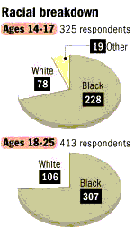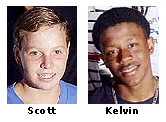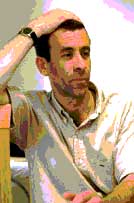The Cincinnati Enquirer
Cincinnati youth have their say: Healing city's wounds involves respect, trust
By Kristina Goetz, Augost 16, 2001
Brandon wants more respect from police.
Brittany more police interaction with youth.
Kelvin says there needs to be more cultural
understanding.
And Scott says people should know that
cops are just like everybody else.
Hundreds of Greater Cincinnati youths,
like these four, filled out surveys online
and on the streets.
They recounted the same kinds of stories of discrimination by Cincinnati
police - and support for officers - heard on TV, talk radio and
at City Council even before the April unrest.
|
|
Because of this comprehensive outreach effort, the ideas
articulated by these 738 Cincinnatians ages 14-25 will
become part of an unprecedented mediation to settle a
federal lawsuit accusing the city of decades of
discrimination against blacks.
It may even begin to heal a city divided by race.
The youths who participated are "all aspiring for something in their
lives to make a difference," says Nashid Shakir, a survey collector
and head of the Cincinnati Collective Learning Center.
"We gave them the opportunity to say it to somebody who is willing
to listen."
Today, 75 to 100 youths who took part in the survey will meet at
the Albert B. Sabin Cincinnati Convention Center downtown to take
the next step in a mediation process organized by the Aria Group,
an internationally known conflict resolution firm.
|

|
These young adults will sharpen
and prioritize six goals to improve police-community relations.
Those goals range from developing more respect between police and
citizens, to strengthening Cincinnati's investment in community
education and development.
Over the next several months, these youth goals will be spliced
with those from thousands of other people surveyed.
The Aria Group organized its survey process by identifying eight
"identity" groups from which it wants ideas, including - in addition
to youths - police officers, business people and African-Americans.
The process will culminate in a settlement agreement to be presented
to a federal judge in December.
|
|
Goal:
Respect, responsibility
Kelvin Brown, 14, of North College Hill, and Scott Wilson, 14, of
Westwood, meet interviewers during a freshman preparatory class
this summer at St. Xavier High School in Finneytown.
Kelvin tells them he wants to require officers to take more intense
cultural diversity classes.
"They (police) need to know
more than they do now.
Find out why the black, white, yellow, blue man laughs the way he
does."
That goes for the way he dresses, too, the kind of music he loves
and the way he carries himself.
"Why do black people listen
to rap?" Kelvin asks rhetorically.
"Why do white people listen
to country? It is about black and white.
|
 |
It's what you're exposed to. It's about what police are exposed
to.
"Have them exposed to all of it."
Scott's cousin, Jim Robb, works for the Cincinnati Police Division,
so he knows what the job entails.
Scott says he wants people to know that officers abide by the same
laws they enforce.
"Just because you're in the system
doesn't mean you have special privileges," Scott explains.
"I've seen how they come home to their families if they have
them, eat dinner, sit on the couch. "They have to drive home the
same way we do.
You don't have a sticker that says, "Don't arrest me, I'm police.'"
Voices from the streets Voices like Kelvin's and Scott's will have
a profound impact on which direction Cincinnati decides to take
on the road to change.
|
 |
"In a lot of ways the youth
gave Cincinnati its wake-up call," Aria Group president Jay Rothman
says of the April 9-12 protests and riots.
"(But) not only
are they giving us a wake-up call, they are telling us, "We want
to be engaged in developing the changes.'"
Black activists and the American Civil Liberties Union sued the
city in March, asking a federal court to end what they say has been
30 years of unchecked discrimination by police officers.
The case could have gone to court, but the parties involved - the
city, police union, the ACLU and the Cincinnati Black United Front
- agreed to try mediation first.
Mr. Rothman and his Yellow Springs, Ohio-based Aria Group, were
named by U.S. District Judge Susan Dlott to spearhead that effort.
|
 |
|
The result could become a model for other cities struggling with
similar issues.
For months, Mr. Rothman and his team have been reaching out to
youth, using methods they have not attempted for the thousands
of adult opinions they seek.
"In a lot of ways the youth gave Cincinnati its wake-up call,"
Aria Group president Jay Rothman says of the April 9-12 protests
and riots.
"(But) not only are they giving us a wake-up call, they are telling
us, "We want to be engaged in developing the changes.'"
Black activists and the American Civil Liberties Union sued the
city in March, asking a federal court to end what they say has
been 30 years of unchecked discrimination by police officers.
The case could have gone to court, but the parties involved -
the city, police union, the ACLU and the Cincinnati Black United
Front - agreed to try mediation first.
Mr. Rothman and his Yellow Springs, Ohio-based Aria Group, were
named by U.S. District Judge Susan Dlott to spearhead that effort.
The result could become a model for other cities struggling with
similar issues.
For months, Mr. Rothman and his team have been reaching out to
youth, using methods they have not attempted for the thousands
of adult opinions they seek.
They canvassed neighborhoods, set up sessions at schools, visited
community centers and walked the streets.
Organizers enlisted the help of the Cincinnati Collective Learning
Center, a for-profit group involved in community development.
The center sent out 18 interviewers over many weeks.
"We understood the kids wouldn't come to us," Mr. Rothman says,
adding that talking to teens on their turf made all the difference.
By using interviewers who live in those neighborhoods, the ideas
and stories became much richer.
So says Arthur Goshade, 27, who with a group of other young black
men in the West End works for Enterprises, a pest-control and
cleaning business.
Employees there decided to become interviewers because they believe
the process will lead to change and they wanted others in their
community to participate.
"The surveys serve as a voice and everybody is jumping on the
chance to be heard," Mr. Goshade says.
Just respect us Passing out Gatorade and chips on a hot summer
day in the West End, interviewers meet teens like Brandon Turner
of Clifton, soon to be 18 and headed to Miami University.
Like many of his peers, Brandon wants police officers to show
respect.
He grew up in the West End - an area hit hard by the April riots
- and often hangs out near the Findlay Street Neighborhood House
at Findlay and Baymiller. "It's hard down here," he explains.
"Moms on welfare and kids can't get jobs and they (police) judge
you by your appearance."
He wants police officers who patrol his old neighborhood to know
good things do happen there. And that there are good people who
deserve to be treated well.
"Police will say, "You guys better get off that corner right now
or we'll take you to jail,'" he says.
"It's happened to me. It's happened to a lot of my friends.
"They don't give citizens enough respect."
Brittany Wright of the West End sits at a U-shaped table at the
Findlay Street community center talking to the same surveyors.
Brittany, 15, who works at the center to "stay out of trouble,"
says she tries to be a role model for the children who play there.
Her view epitomizes some of the same frustrations other youth
expressed in their surveys.
Many said they wanted more police involvement in their communities.
"Little kids need us just like we need adults," she said, and
that's why she thinks officers regularly interacting with youth
will help police-community relations.
"To have somebody older to look up to because that's somebody
I needed," she says. "To tell them, "Stay in school. Keep your
mind off the streets.
Go to college.'" Brittany has plenty of suggestions for police
to do more than they are doing now.
"Maybe come and eat lunch with the kids some day," she says. "Play
basketball, have football games.
It can be some kind of program where we can know where they are
coming from. "We need them to tell us that."
Toward understanding These stories and those to be told in coming
months are what professionals from the Aria Group hope to use
as a vehicle to gain understanding and a foundation for change.
"Our youth are becoming our teachers in some ways," Mr. Rothman
says.
"What people have said to me is, this is incredible.
"These youth are talking about a future that they want, about
goals that are big enough to matter but small enough to work."
top
Back next
|
|